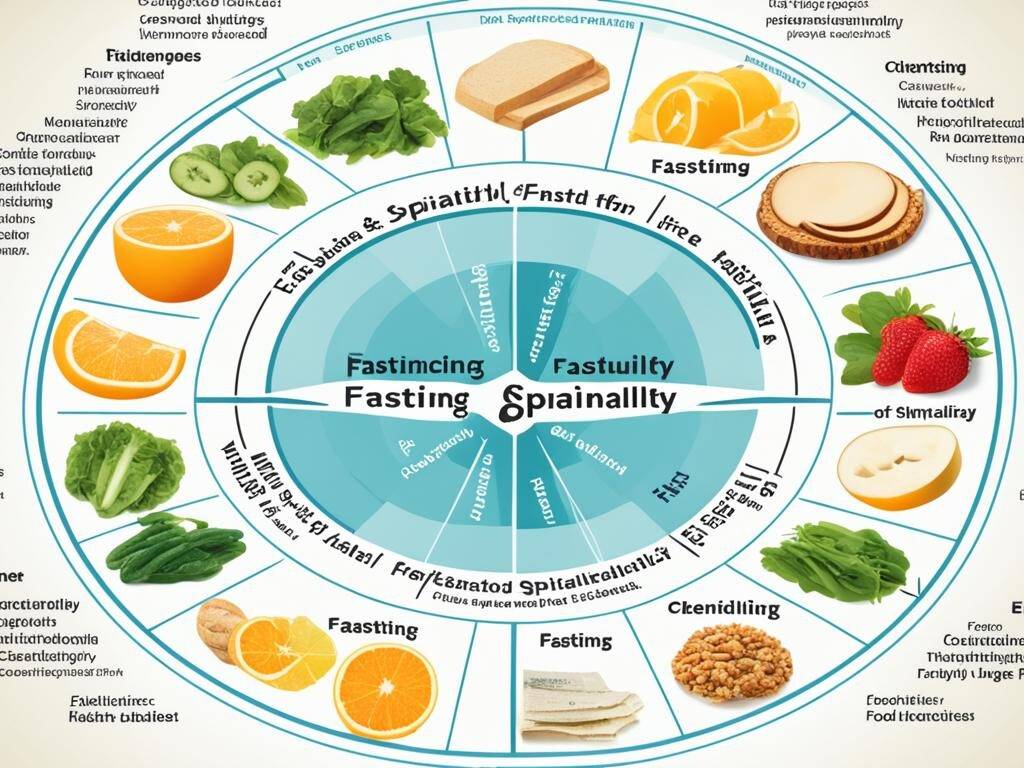Have you ever wondered how fasting can transform your spiritual growth and physical wellbeing? Is there a connection between abstaining from food and deepening your relationship with God? Can fasting truly enhance your overall health and well-being? Let’s explore the transformative power of fasting in this article, backed by biblical insights and principles.
Key Takeaways:
- Discover the biblical principles behind fasting and its relevance to spiritual growth.
- Explore the physical benefits of fasting, including weight loss, improved metabolism, and immune function.
- Understand the importance of fasting as a spiritual reset, cleansing your mind and soul.
- Uncover key Bible verses that shed light on the significance of fasting in our spiritual lives.
- Learn about different types of fasting and how to incorporate it into your lifestyle.
Understanding Fasting in the Bible
Before we delve into the transformative power of fasting for spiritual growth and physical wellbeing, it’s essential to gain a clear understanding of fasting in the Bible. By exploring the principles and reasons behind fasting as mentioned in the scriptures, we can establish a solid foundation for our journey.
Fasting in the Bible is not merely an abstention from food; it is a practice deeply rooted in faith and obedience to God. Throughout the Old and New Testaments, we find numerous references to fasting, highlighting its significance in the lives of believers.
In the Bible, fasting serves different purposes. It is a means of seeking God’s guidance, repenting, expressing sorrow, seeking deliverance, and demonstrating devotion. Fasting is often combined with prayer and meditation, creating a powerful spiritual practice.
Jesus said, “When you fast, do not look somber as the hypocrites do, for they disfigure their faces to show others they are fasting. Truly I tell you, they have received their reward in full. But when you fast, put oil on your head and wash your face, so that it will not be obvious to others that you are fasting, but only to your Father, who is unseen; and your Father, who sees what is done in secret, will reward you.” (Matthew 6:16-18 NIV)
This biblical teaching emphasizes the importance of fasting as a personal and intimate act of devotion. It encourages us to focus on our relationship with God rather than seeking recognition from others.
By immersing ourselves in the biblical understanding of fasting, we lay a strong foundation for our fasting journey. The principles and examples found in the scriptures guide us as we seek spiritual growth and physical wellbeing through this transformative practice.

With this understanding, we can now explore the physical benefits of fasting and how it contributes to our overall health and wellbeing.
The Physical Benefits of Fasting
Fasting offers a multitude of physical benefits that contribute to overall well-being. When practiced properly, it can have a positive impact on various aspects of our physical health.

One of the most noticeable effects of fasting is weight loss. By creating a calorie deficit, fasting can help shed excess pounds and reduce body fat. It also encourages the body to use stored fat as an energy source, which can contribute to a leaner physique.
Furthermore, fasting can have a significant impact on metabolism. During a fast, the body undergoes several changes to adapt to the reduced food intake. These adaptations can boost metabolic rate, increase fat burning, and improve insulin sensitivity, leading to enhanced energy efficiency.
Fasting has also been found to have a positive influence on immune function. Research suggests that intermittent fasting can trigger autophagy, a process where damaged cells are cleared out, and the immune system is strengthened. This can potentially reduce the risk of chronic diseases and boost overall immune health.
“Fasting can be a powerful tool for improving our physical health and well-being. It not only promotes weight loss but also enhances our metabolism and supports a stronger immune system.” – Dr. Jane Williams, nutrition expert.
In addition to these benefits, fasting has been linked to improved cardiovascular health. It can help lower blood pressure, reduce cholesterol levels, and decrease inflammation, all of which contribute to a healthier heart and a reduced risk of heart disease.
Other potential physical benefits of fasting include improved brain function, increased longevity, and enhanced gut health. While more research is needed to fully understand the extent of these benefits, the existing evidence suggests that fasting can positively impact various aspects of our physical well-being.
The Takeaway
Fasting can offer significant physical benefits, from weight loss and improved metabolism to enhanced immune function and cardiovascular health. Incorporating fasting into your lifestyle, under the guidance of healthcare professionals, can help you achieve your health and wellness goals. Remember to personalize your fasting approach based on your unique needs and consult with a healthcare provider before making any major changes to your diet or fasting routines.
Fasting for Spiritual Reset
Fasting is not just about the physical benefits; it is a powerful practice that can provide a spiritual reset. When we abstain from food, we create space within ourselves to cleanse our minds and souls, allowing for spiritual growth and reflection.

During a fast, our focus shifts from external distractions to our internal world. We become more attuned to our thoughts, emotions, and spiritual connections. It is a time of deep introspection and self-discovery.
By cleansing the mind and soul through fasting, we release negative energies and patterns that no longer serve us. We make room for new insights, clarity, and a renewed sense of purpose.
Fasting allows me to reset my spiritual compass. It’s a time when I can let go of distractions and reconnect with my higher self. Through this process, I find inner peace and a deeper understanding of my purpose. – [Your Name]
A spiritual reset through fasting can bring about profound personal transformation. It enables us to let go of past grievances, forgive ourselves and others, and cultivate a sense of compassion and gratitude.
The Benefits of Fasting for Spiritual Reset
- Cleansing: Fasting helps cleanse our minds and souls from negative thoughts, emotions, and energies. It allows us to let go of mental and emotional baggage, creating a fresh start.
- Clarity: By removing distractions, fasting brings clarity to our thoughts and feelings. We gain a deeper understanding of ourselves, our values, and our spiritual journey.
- Connection: Fasting provides an opportunity to strengthen our connection with a higher power, whatever that may be for each individual. It enhances our ability to tune into our intuition and receive guidance.
- Spiritual Growth: Through fasting, we can experience accelerated spiritual growth. We become more aware of our purpose, experience increased compassion and empathy, and open ourselves up to higher levels of consciousness.
Fasting for a spiritual reset requires intention and mindfulness. It is a personal journey that can be tailored to individual beliefs and practices. Whether it’s a day-long fast or an extended period, the key is to approach fasting with an open heart and a willingness to surrender.
As you embark on your fasting journey, remember to listen to your body and practice self-care. Seek guidance from spiritual teachers, mentors, or religious leaders who can provide insight and support along the way.
Embrace the transformative power of fasting for a spiritual reset, and watch as it opens doors to growth, healing, and deeper connection.
Biblical Verses on Fasting
In our spiritual journey, the Bible offers valuable guidance through verses that emphasize the importance and significance of fasting. These scriptures serve as a wellspring of inspiration and motivation, encouraging us to embark on the path of fasting for spiritual growth and personal transformation.
1. Matthew 6:16-18
“When you fast, do not look somber as the hypocrites do, for they disfigure their faces to show others they are fasting. Truly I tell you, they have received their reward in full. But when you fast, put oil on your head and wash your face, so that it will not be obvious to others that you are fasting, but only to your Father, who is unseen. And your Father, who sees what is done in secret, will reward you.”
2. Isaiah 58:6-7
“Is not this the kind of fasting I have chosen: to loose the chains of injustice and untie the cords of the yoke, to set the oppressed free and break every yoke? Is it not to share your food with the hungry and to provide the poor wanderer with shelter— when you see the naked, to clothe them, and not to turn away from your own flesh and blood?”
3. Joel 2:12
“Even now,” declares the Lord, “return to me with all your heart, with fasting and weeping and mourning.”
4. Acts 27:9
“Paul warned them, ‘Men, I can see that our voyage is going to be disastrous and bring great loss to ship and cargo, and to our own lives also.'”
These are just a few examples of the many Bible verses that shed light on the transformative nature of fasting. By meditating on these scriptures, we can gain a deeper understanding of the spiritual significance and purpose behind our fasting endeavors.

Different Types of Fasting
If you’re considering fasting, it’s important to explore the different types of fasting that you can practice. Each type offers its own unique benefits and challenges, allowing you to choose the approach that best suits your lifestyle and goals. Let’s take a closer look at the various methods:
1. Intermittent Fasting
Intermittent fasting involves alternating between periods of fasting and eating. This approach typically involves fasting for a certain number of hours each day, such as 16 hours of fasting followed by an 8-hour eating window. Intermittent fasting can be flexible and easily incorporated into daily routines, making it popular among individuals striving for sustainable weight loss and improved metabolic health.
2. Water Fasting
Water fasting involves abstaining from all food and only consuming water for a specific duration. This type of fasting typically lasts for 24 hours or more, allowing your body to enter a state of ketosis where it starts using stored fat for energy. Water fasting is known for its detoxifying effects and can promote weight loss, improved digestion, and enhanced mental clarity.
3. Juice Fasting
Juice fasting involves consuming only freshly squeezed juices from fruits and vegetables while refraining from solid foods. This type of fasting provides essential nutrients and antioxidants while allowing your digestive system to rest. Juice fasting is beneficial for detoxifying the body, boosting the immune system, and increasing energy levels.
“The various types of fasting offer unique approaches to achieving spiritual growth and physical wellbeing. Whether you choose intermittent fasting, water fasting, or juice fasting, each method has its own benefits and challenges that can support your fasting journey.”

By understanding and exploring the different types of fasting, you can select the fasting approach that resonates with you. Remember, it’s essential to listen to your body and consult with a healthcare professional before embarking on any fasting regimen.
Preparing for a Successful Fast
Embarking on a fast requires careful preparation and setting clear intentions. By taking the time to prepare yourself physically and mentally, you can maximize the benefits of your fasting experience. Here are some practical tips to help you prepare and create a fasting plan that aligns with your goals:
- Educate yourself: Before starting your fast, educate yourself about the different fasting methods and their potential effects on your body. Understanding the science behind fasting will help you make informed decisions throughout your journey.
- Consult a healthcare professional: If you have any underlying health conditions or concerns, it’s essential to consult with a healthcare professional before beginning your fast. They can provide guidance and ensure that fasting is safe for you.
- Set clear intentions: Reflect on why you want to fast and what you hope to achieve. Whether it’s for spiritual growth, weight loss, or overall wellbeing, having clear intentions will keep you focused and motivated throughout the fast.
- Choose the right duration: Determine the length of your fast based on your goals and comfort level. It can range from a few hours to several days or even longer. Start with a shorter duration if you are new to fasting and gradually increase it as you become more accustomed.
- Prepare your body: Gradually reduce your intake of processed foods, caffeine, and sugary beverages in the days leading up to your fast. Focus on consuming whole foods and hydrating your body to ensure it is prepared for the upcoming fasting period.
- Mentally prepare: Fasting can be challenging both physically and mentally. Take time to mentally prepare yourself by practicing mindfulness, meditation, or engaging in activities that promote relaxation and self-reflection.
- Create a fasting plan: Design a fasting plan that suits your lifestyle and goals. Decide on the specific fasting method you will follow, whether it’s intermittent fasting, water fasting, or another approach. Determine the timing and duration of your fasting periods and create a schedule that works best for you.
“Preparation is the key to success when it comes to fasting. By setting clear intentions and creating a well-thought-out plan, you can maximize the benefits of your fasting journey.” –

By following these tips and implementing a comprehensive fasting plan, you can embark on a successful fast that aligns with your goals and intentions. Remember to listen to your body throughout the process and make any necessary adjustments to ensure a safe and positive fasting experience.
Navigating Challenges During Fasting
Fasting can present various challenges, especially in the initial stages. It is important to be aware of these hurdles and have strategies in place to overcome them. In this section, I will discuss some of the common challenges that may arise during fasting and provide tips on how to manage hunger, deal with cravings, and overcome potential obstacles.
Managing Hunger
One of the main challenges during fasting is managing hunger. As your body adjusts to the change in eating patterns, you may experience increased hunger pangs. Here are some strategies to help you manage hunger:
- Stay hydrated: Drinking an adequate amount of water throughout the day can help reduce feelings of hunger. Aim to drink at least 8 glasses of water daily.
- Include fiber-rich foods: Consuming foods that are high in fiber, such as fruits, vegetables, and whole grains, can help keep you feeling full for longer.
- Plan balanced meals: When breaking your fast, include a balance of protein, healthy fats, and carbohydrates to ensure you feel satisfied and avoid excessive hunger.
Dealing with Cravings
Cravings for certain foods can be a significant challenge during fasting. Here’s how to manage cravings:
- Identify triggers: Recognize what triggers your cravings. Is it certain foods, emotions, or situations? Once you identify the triggers, find alternative activities or distractions to replace the urge to indulge in unhealthy cravings.
- Choose healthier options: If you are experiencing cravings, opt for healthier alternatives. For example, instead of reaching for a sugary snack, satisfy your sweet tooth with a piece of fruit.
- Mindful eating: Practice mindful eating by savoring each bite and paying attention to the flavors and textures of the food. This can help you feel more satisfied and reduce cravings.
“By recognizing the difference between physical hunger and emotional cravings, you can maintain control over your eating habits during fasting.”
Overcoming Potential Obstacles
During your fasting journey, you may encounter obstacles that challenge your commitment and motivation. Here are some tips to help you overcome these obstacles:
- Seek support: Connect with others who are also fasting or join a fasting community online or in person. Having support and encouragement can make a significant difference in staying motivated.
- Practice self-care: Take care of your overall well-being by getting enough rest, engaging in regular physical activity, and managing stress. These practices can contribute to a positive mindset and help you stay committed to your fasting goals.
- Stay focused on the benefits: Remind yourself of why you chose to fast and the benefits you hope to gain. Focus on the positive changes to your health and spirituality that fasting can bring.
By learning to navigate these challenges, you can maintain your fasting practice successfully and embrace the transformative power it holds.

Incorporating Prayer and Meditation During Fasting
Prayer and meditation are powerful practices that can enhance the spiritual experience during fasting. These practices allow us to deepen our connection with a higher power and foster spiritual growth. By incorporating prayer and meditation into your fasting routine, you can create a sacred space for reflection and self-discovery.
During prayer, you can express your gratitude, seek guidance, or simply offer words of devotion. Whether it’s reciting prayers from religious texts or speaking from the heart, prayer can provide comfort and strength during fasting. It allows you to surrender your worries and connect with the divine.
Similarly, meditation is a practice of mindfulness and introspection. By quieting the mind and focusing on the present moment, meditation can help you cultivate a sense of inner peace and clarity. It allows you to observe your thoughts and emotions without judgment, creating space for spiritual reflection.
While fasting, consider setting aside dedicated time for prayer and meditation. Find a quiet and peaceful environment where you can sit comfortably and undisturbed. You can use traditional meditation techniques such as focusing on your breath or repeating a mantra, or explore guided meditation practices available in various forms.
Remember, prayer and meditation are highly personal practices, and there is no one-size-fits-all approach. Find what resonates with you and create a routine that works for your needs and beliefs. Allow yourself to be fully present and open to receiving the spiritual nourishment that comes from prayer and meditation during fasting.
“Prayer is not asking. It is a longing of the soul. It is daily admission of one’s weakness. It is better in prayer to have a heart without words than words without a heart.” – Mahatma Gandhi
Incorporating prayer and meditation during fasting can transform the experience into a profound journey of self-discovery and spiritual connection. Embrace these practices as you embark on your fasting journey, and allow them to guide you towards deeper insights and spiritual growth.
Benefits of Prayer and Meditation during Fasting:
- Enhances spiritual connection and reflection
- Provides a sense of peace and tranquility
- Aids in self-reflection and self-awareness
- Reduces stress and promotes emotional well-being
- Deepens understanding and clarity of purpose
By incorporating prayer and meditation into your fasting routine, you can experience a holistic approach to spiritual and physical well-being. Allow these practices to nourish your soul as you continue your fasting journey.

Breaking the Fast – Post-Fasting Strategies
After completing a fasting period, it is essential to approach the process of breaking the fast with care and attention. This stage is crucial to avoid any adverse effects on the body and ensure a smooth transition back to normal eating habits. In this section, I will discuss post-fasting strategies that will help you navigate this phase successfully.

Transitioning Back to Normal Eating
Transitioning back to regular meals should be done gradually and mindfully. It’s important to remember that your body may have adapted to the fasting routine, and sudden reintroduction of large amounts of food can cause discomfort or digestive issues.
Start by consuming small, light meals that are easy to digest. Focus on incorporating whole foods such as fruits, vegetables, lean proteins, and whole grains. This will provide your body with the essential nutrients it needs while easing it into the process of digesting solid foods again.
Listen to your body and pay attention to any signals of fullness or discomfort. If you feel satisfied with smaller portions, there’s no need to force yourself to eat more. Your appetite will naturally adjust as your body readjusts to regular eating habits.
Reintroducing Food Slowly
When breaking a fast, it’s advisable to reintroduce individual food groups gradually. This will allow you to identify any potential sensitivities or reactions that may have developed during the fasting period.
Consider starting with easily digestible foods such as soups, broths, or smoothies. These will provide hydration and nourishment without overwhelming your digestive system. As you progress, slowly introduce cooked vegetables, lean proteins, and complex carbohydrates. Monitor how you feel after consuming each food group and make adjustments accordingly.
Remember, the goal is to find a balanced approach that supports your overall well-being while maintaining the positive changes achieved during the fast.
Post-Fast Care
Effective post-fast care involves supporting your body’s recovery and providing it with the necessary nutrients and hydration. Make sure to prioritize the following:
- Hydration: Drink plenty of water and herbal teas to replenish your body’s fluid levels.
- Nutrient-dense foods: Choose foods that are rich in essential vitamins, minerals, and antioxidants to support your overall health.
- Rest and relaxation: Allow yourself time to rest and recover after completing a fast. Practicing self-care activities such as gentle stretching, meditation, or taking soothing baths can help promote relaxation and rejuvenation.
By incorporating these post-fasting strategies into your routine, you can ensure a smooth transition back to normal eating while maintaining the benefits you achieved during your fast. Remember, breaking a fast is as important as the fasting itself.
Long-term Benefits of Fasting
Fasting offers more than just short-term benefits; it can also have long-lasting effects on our spiritual growth and overall health. By incorporating fasting as a regular practice, we can experience sustained improvements in both these areas.
When it comes to spiritual growth, fasting allows us to detach from worldly distractions and focus our attention on our relationship with a higher power. By denying ourselves physical nourishment, we open up space for deeper introspection, prayer, and meditation. This sustained spiritual growth can lead to a greater sense of purpose, increased clarity, and a stronger connection with our faith.
In terms of physical health, fasting offers a range of long-term benefits. It can help regulate our metabolism, improve insulin sensitivity, and optimize our body’s natural detoxification processes. Fasting also aids in weight management and can contribute to a healthier cardiovascular system. Additionally, studies have shown that fasting can have anti-aging effects and may even reduce the risk of chronic diseases such as diabetes, cancer, and Alzheimer’s.
To integrate fasting as a regular practice in your life, consider starting with intermittent fasting, where you alternate between periods of eating and fasting. This approach allows for flexibility and can be adjusted to suit your lifestyle and personal preferences. As you become more comfortable with fasting, you can explore longer fasts, engaging in water fasting or juice fasting under the guidance of a healthcare professional.
Integrating fasting into your life can provide long-term benefits that extend beyond the physical and spiritual realms. It is a transformative practice that has the potential to enhance your overall well-being and contribute to a more fulfilled and purposeful life.
Remember, fasting should always be approached with mindfulness and respect for your body’s needs. It’s important to listen to your body and seek professional guidance if you have any underlying health conditions or concerns.

Continue reading to discover practical tips on how to prepare for fasting and navigate the challenges that may arise during your fasting journey. Explore the next section to learn more about incorporating prayer and meditation into your fasting routine, and discover the strategies for breaking a fast and transitioning back to normal eating.
Conclusion
In conclusion, fasting can be a powerful tool for both spiritual growth and physical wellbeing. Through a deep understanding of the biblical principles behind fasting, I have discovered how this practice can transform my life on multiple levels. Exploring different fasting techniques, such as intermittent fasting, water fasting, and juice fasting, has allowed me to find an approach that suits my lifestyle and goals.
Integrating prayer and meditation into my fasting routine has enhanced my spiritual connection and self-reflection. With careful preparation and a long-term perspective, I have come to see fasting as an integral part of my spiritual and health practices. It is no longer just a temporary endeavor but a lifelong journey.
I invite you to embrace the power of fasting and experience its profound effects in your own life. Whether you seek spiritual growth, improved health, or both, fasting can be a transformative practice. So, prepare yourself physically and mentally, explore the depths of your spirituality, and embark on a fasting journey that will empower and enrich you.

